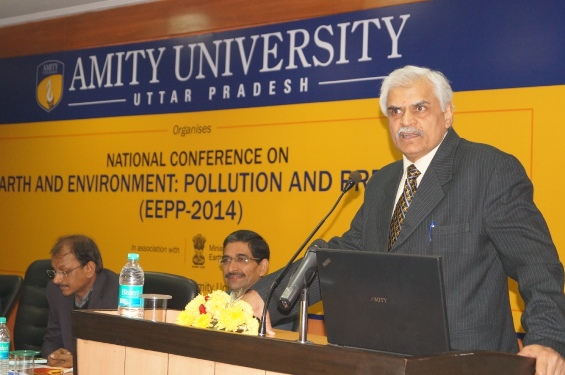28 Jan 2014-30 Jan 2014|Noida | Amity University Campus, Sector-125 Noida
Amity Institute of Environmental Toxicology, Safety and Management organises Three day National Conference on "Earth and Environment: Pollution and Prevention"

Amity Institute of Environmental Toxicology, Safety and Management (AIETSM) started three day National Conference on "Earth and Environment: Pollution and Prevention" from January 28- 30, 2014 at Amity University Campus, Sector – 125, Noida.
The Conference aims to provide an opportunity to discuss and deliberate upon various kinds and means of pollution, and methods that may be applied to prevent and control environmental pollution. Various research papers presented during the Conference would be based on three sub themes- “Land Use and Soil Health”, “Ocean and Water Resources” and “Air Quality, Atmosphere and Climate Change.”
Welcoming the august gathering, Prof. Tanu Jindal- Director, Amity Institute of Environmental Toxicology, Safety and Management (AIETSM) said that human beings don’t inherit Planet Earth from their ancestors but they borrow it from their children with a due responsibility to preserve and nurture it for future generations. She stressed that the focus on the concern of environmental issues is very important since, prevention is better than cure. Prof. Jindal remarked that the Conference proposes to draw attention to the societal benefits in reducing risks to ecosystem and human health. She expressed her hope that the Conference would help to identify principles that can be usefully applied in accessing opportunities for pursuing eco-friendly approach to environment.
Expressing his views, Dr. John Dunham, Dy. Chief for Environment, Science and Technology Affairs, US Embassy applauded Amity University for organizing a Conference on a topical issue. He stressed that pollution control, judicious management of resources and good environment management are very important and require a great deal of coordination amongst Civil society, Private sector and Government. He remarked that it is generally considered that environmental regulations hurt economic gains and businesses have to incur additional costs to comply with environment whereas, the long term benefits derived by adhering to environmental regulations surpass the costs incurred. He suggested that environmental regulations should involve careful alignment of Science, Economics and Law and advocated that the penalties for non- compliance should be high and costs of compliance should be less than cost of non- compliance. He opined that Environmental activists and Private Sector should not consider themselves as adversaries. Although, private sector is driven by profits but they are becoming increasingly aware of their social responsibility and are resorting to greener technologies for societal benefit.
Dr. Sanjay Bajpai-Director/ Scientist 'F', Technology Mission Cell Water & Solar Energy, Department of Science & Technology, New Delhi, while sharing his views, said that Green technology makes business sense since, green fuels are environment friendly, more effective and less consumed as compared to traditional fuels. He informed the gathering that 70% of the earth is water and out of that water, 97% is saline and is found in oceans and only 3% is fresh water which could be used for drinking purposes. He remarked that per capital water availability is decreasing globally which, to some extent, can be owed to massive developmental activities carried on at rapid pace, not only affecting the quantity but also the quality of water. Though, oceans are not being tapped today but in future, they have to be resorted to for portable water. He stressed that there is a pressing need to build the capacities of the community so that they are empowered enough to identify the kind of water contamination and select the appropriate technology to get rid of it, rather than settling down for standard purification devices and systems. He called upon the young scientists and researchers to develop effective water testing kits to check the portability of water and develop newer technologies to recycle and re-use scarce resources.
Addressing the gathering, Prof. Dr. R. K. Khandal, Vice Chancellor, Uttar Pradesh Technical University, Lucknow, Uttar Pradesh opined that waste is also a resource, if recycled and re-used properly but that does not mean that one has to generate waste to use it later on. He opined that production of waste should be discouraged at every level and there should be some incentives and awards specially designed by Government for non- polluting units. He stressed that human beings can save the environment by changing their small habits such as switching off unnecessary lights in the house, sleeping on time and using natural sources of light as much as possible etc. He remarked that if earth supports human beings then environment sustains them and if environmental concerns are not addressed on time than calamities like Uttarakhand are bound to re-occur. He called upon the audience do whatever they can in their individual capacities to check and prevent environmental issues. He motivated them to use their installed capabilities (inherent capabilities) rather than operational capabilities (which are just 30% of the inherent capabilities) to reduce pollution. Corroborating it further, the speaker shared that human bodies have a capability to easily get acclimatized to extreme temperatures therefore, there is no need for using AC’s and Geysers.
Dr. Vinod Babu-Incharge of HW management Division, Central Pollution Control Board (CPCB) outlined the functioning of CPCB and highlighted its advisory role to Government with reference to recommending pollution standards for various industries. He explained Treatment, Storage, Disposal Facility (TSDF) adopted by CPCB to check increasing pollution and stressed that “Landfill” is a least preferred option since, it consumes lot of space and is a problem forever.
During the inauguration, Abstract Book of the Conference was also released by the Guests.